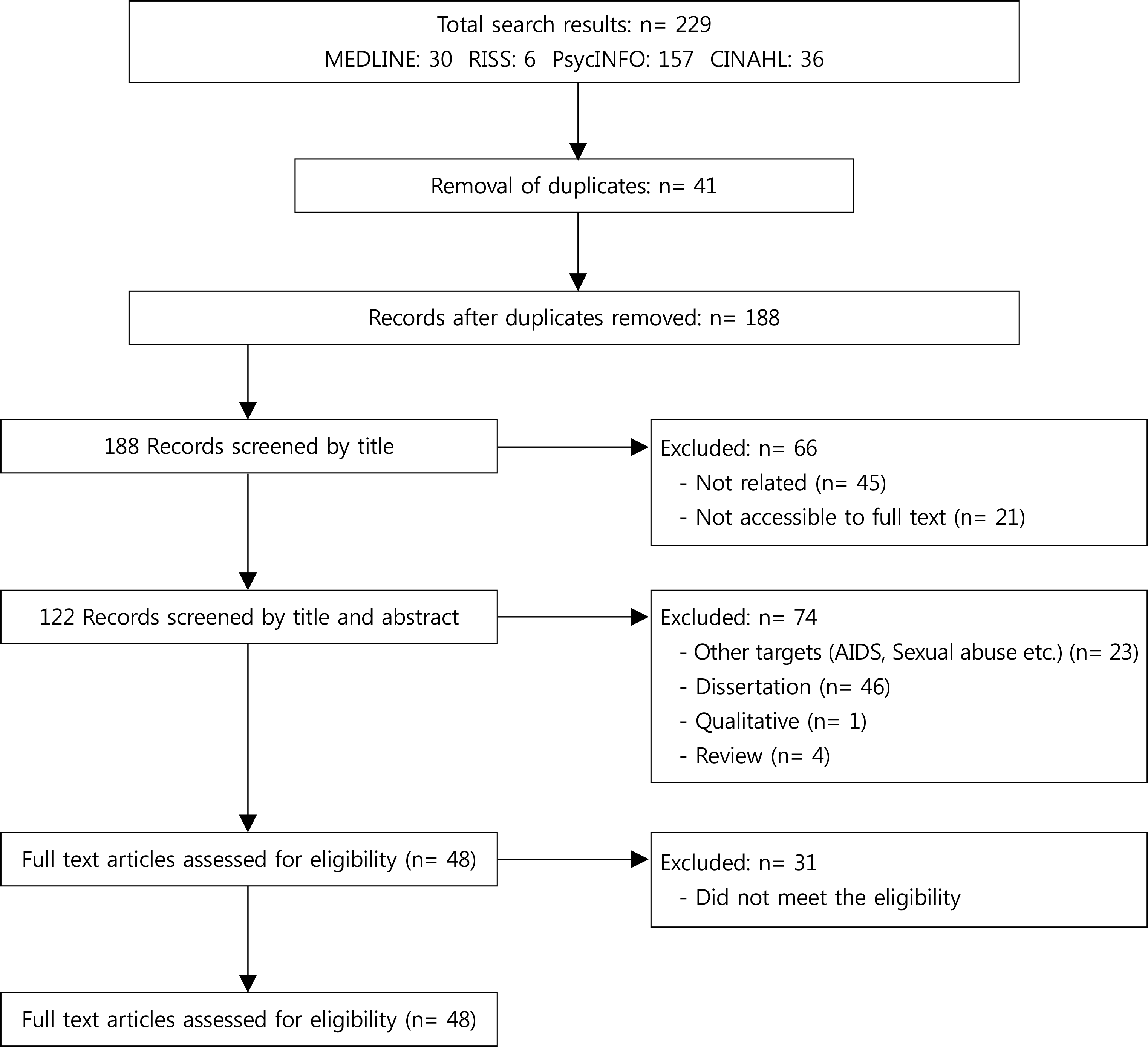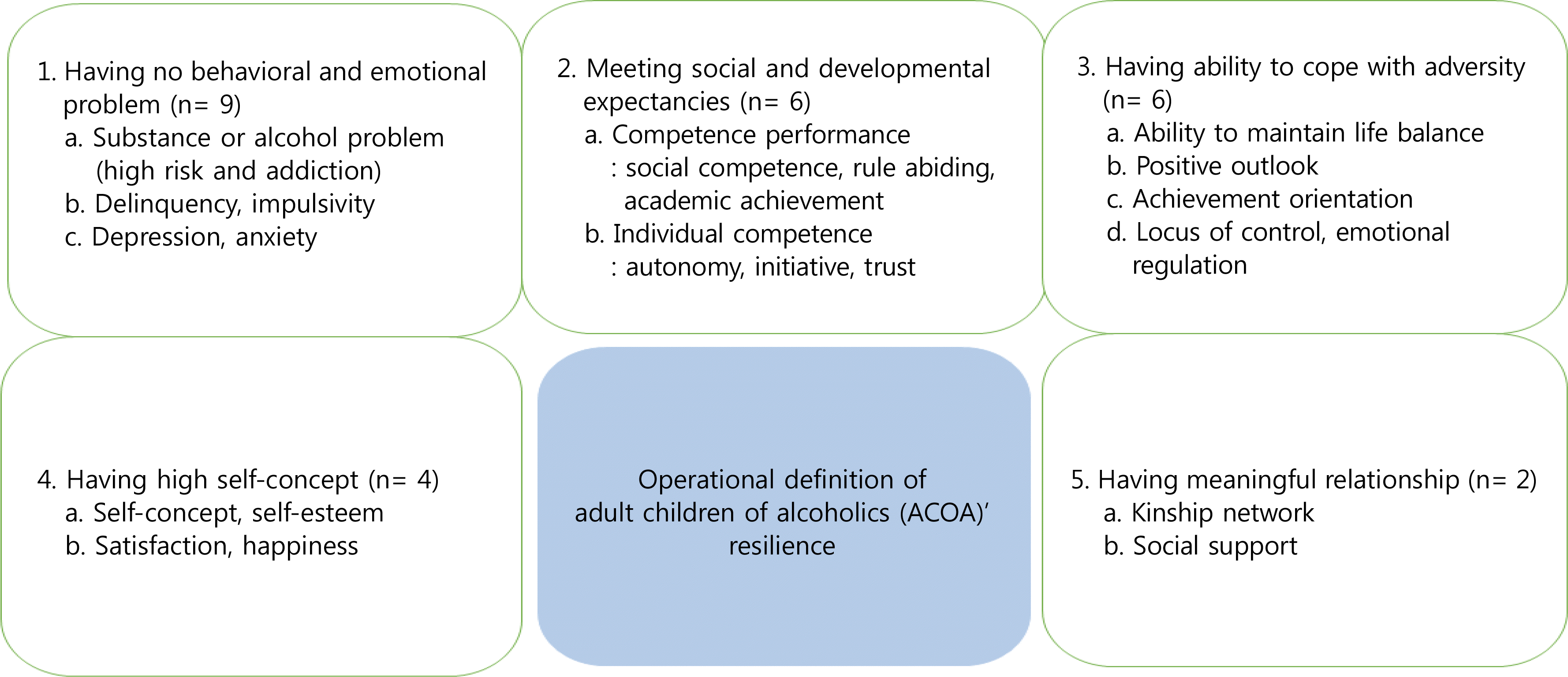1. Ministry of Health and Welfare. The Survey of Mental Disorders in Korea 2016. Ministry of Health and Welfare Statistics [Internet]. 2016. [cited 2018 Sep 28]. Available from:. http://www.mohw.go.kr/react/jb/sjb1101vw.jsp?SEQ=85&MENU_ID=03320101&page=1&PAR_MENU_ID=03#.
2. Ministry of Health and Welfare. Korea National Health & Nutrition Examination Survey 2017. Ministry of Health and Welfare Statistics [Internet]. 2017. [cited 2018 Dec 27]. Available from:. http://www.mohw.go.kr/react/jb/sjb1101vw.jsp?SEQ=88&MENU_ID=03320101&page=1&PAR_MENU_ID=03#.
3. Park HS, Lee SG. Association between psychological characteristics of adult-children of alcoholics and psychosocial problems. Korean Journal of Social Welfare. 2001; 46:118–144.
4. Lee HH, Cranford JA. Does resilience moderate the associations between parental problem drinking and adolescents' internalizing and externalizing behaviors? A study of Korean adolescents. Drug and Alcohol Dependence. 2008; 96(3):213–221. https://doi.org/10.1016/j.drugalcdep.2008.03.007.
5. Kim HK, Lee MH. Factors influencing resilience of adult children of alcoholics among college students. Journal of Korean Academy of Nursing. 2011; 41(5):642–651. https://doi.org/10.4040/jkan.2011.41.5.642.

6. Lee HR, Park SM. A study of the relationships between attachment to parents, image of God and resilience among adult children of alcoholics (ACOA). Korean Journal of Christian Counseling. 2013; 24(2):181–213.
7. Drapkin ML, Eddie D, Buffington AJ, McCrady BS. Alcohol-specific coping styles of adult children of individuals with alcohol use disorders and associations with psychosocial functioning. Alcohol and Alcoholism. 2015; 50(4):463–469. https://doi.org/10.1093/alcalc/agv023.

8. Jennison KM, Johnson KA. Resilience to drinking vulnerability in women with alcoholic parents: the moderating effects of dyadic cohesion in marital communication. Substance Use & Misuse. 1997; 32(11):1461–1489. https://doi.org/10.3109/10826089709055873.

9. Hinz LD. College student adult children of alcoholics: psychological resilience or emotional distance? Journal of Substance Abuse. 1990; 2(4):449–457. https://doi.org/10.1016/S0899-3289(12)80005-8.

10. Yau WYW, Zubieta JK, Weiland BJ, Samudra PG, Zucker RA, Heitzeg MM. Nucleus accumbens response to incentive stimuli anticipation in children of alcoholics: relationships with precursive behavioral risk and lifetime alcohol use. The Journal of Neuroscience. 2012; 32(7):2544–2551. https://doi.org/10.1523/JNEUROSCI.1390-11.2012.

11. Werner EE. Resilient offspring of alcoholics: a longitudinal study from birth to age 18. Journal of Studies on Alcohol. 1986; 47(1):34–40.

12. Palmer N. Resilience in adult children of alcoholics: a non-pathological approach to social work practice. Health & Social Work. 1997; 22(3):201–209. https://doi.org/10.1093/hsw/22.3.201.

13. Earvolino-Ramirez M. Resilience: a concept analysis. Nursing Forum. 2007; 42(2):73–82. https://doi.org/10.1111/j.1744-6198.2007.00070.x.

14. Park S, Schepp KG. A systematic review of research on children of alcoholics: their inherent resilience and vulnerability. Journal of Child and Family Studies. 2015; 24(5):1222–1231. https://doi.org/10.1007/s10826-014-9930-7.

15. Lee EY, Lee JS. An intergrative review on Korean nursing studies related to problematic drinker's children. Journal of the Korea Academia-Industrial cooperation Society. 2015; 16(12):8844–8852. https://doi.org/10.5762/KAIS.2015.16.12.8844.

16. Whittemore R, Knafl K. The integrative review: updated methodology. Journal of Advanced Nursing. 2005; 52(5):546–553. https://doi.org/10.1111/j.1365-2648.2005.03621.x.

17. Thompson B, Diamond KE, McWilliam R, Snyder P, Snyder SW. Evaluating the quality of evidence from correlational research for evidence-based practice. Exceptional Children. 2005; 71(2):181–194. https://doi.org/10.1177/001440290507100204.

18. Heitzeg MM, Nigg JT, Yau WYW, Zubieta JK, Zucker RA. Affective circuitry and risk for alcoholism in late adolescence: differences in frontostriatal responses between vulnerable and resilient children of alcoholic parents. Alcoholism, Clinical and Experimental Research. 2008; 32(3):414–426. https://doi.org/10.1111/j.1530-0277.2007.00605.x.

19. Werner EE, Johnson JL. The role of caring adults in the lives of children of alcoholics. Substance Use & Misuse. 2004; 39(5):699–720. https://doi.org/10.1081/JA-120034012.

20. Godsall RE, Jurkovic GJ, Emshoff J, Anderson L, Stanwyck D. Why some kids do well in bad situations: relation of parental alcohol misuse and parentification to children's self-concept. Substance Use & Misuse. 2004; 39(5):789–809. https://doi.org/10.1081/JA-120034016.

21. Hall CW, Webster RE. Multiple stressors and adjustment among adult children of alcoholics. Addiction Research & Theory. 2007; 15(4):425–434. https://doi.org/10.1080/16066350701261865.

22. Barrera M, Hageman DN, Gonzales NA. Revisiting hispanic adolescents' resilience to the effects of parental problem drinking and life stress. American Journal of Community Psychology. 2004; 34(1-2):83–94. https://doi.org/10.1023/B:AJCP.0000040148.72858.81.

23. Haverfield MC, Theiss JA. Parental communication of responsiveness and control as predictors of adolescents' emotional and behavioral resilience in families with alcoholic versus nonalcoholic parents. Human Communication Research. 2017; 43(2):214–236. https://doi.org/10.1111/hcre.12102.
24. Hall JC. An exploratory study of the role of kinship ties in promoting resilience among African American adult children of alcoholics. Journal of Human Behavior in the Social Environment. 2007; 15(2-3):61–78. https://doi.org/10.1300/J137v15n02_05.

25. Carle AC, Chassin L. Resilience in a community sample of children of alcoholics: its prevalence and relation to internalizing symptomatology and positive affect. Journal of Applied Developmental Psychology. 2004; 25(5):577–595. https://doi.org/10.1016/j.appdev.2004.08.005.

26. Kim JH. The college adjustment of adult children of alcoholics: focused on moderating effect of protective factors. Journal of Social Work Practice. 2008; 7:131–157.
27. Haverfield MC, Theiss JA. Parent's alcoholism severity and family topic avoidance about alcohol as predictors of perceived stigma among adult children of alcoholics: implications for emotional and psychological resilience. Health Communication. 2016; 31(5):606–616. https://doi.org/10.1080/10410236.2014.981665.

28. Kim JH. Resilience. 1st ed.Gyeonggi-do: Wisedomhouse;2011. p. 310.
29. Wagnild GM, Young HM. Development and psychometric evaluation of the resilience scale. Journal of Nursing Measurement. 1993; 1(2):165–178.




 PDF
PDF ePub
ePub Citation
Citation Print
Print




 XML Download
XML Download